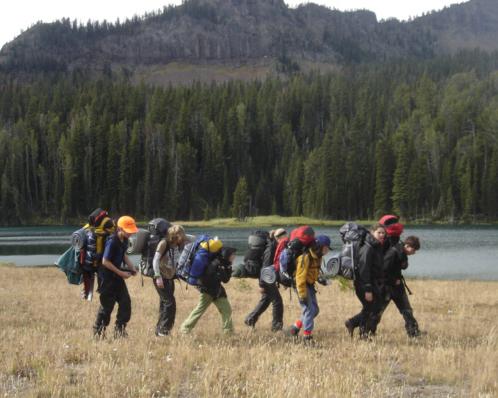Making Magic in the Wilderness
Editor's note: the Three Rivers Montana treatment program is no longer in operation.
Wilderness guide, teacher, medic, mentor, fitness coach, nutritionist, counselor, singer, performer, dancer, naturalist, spiritual advisor, tutor, comic, security guard, off-road driver, backcountry chef… these are just some of the roles Caitlin Wagner has played during one of her eight-day shifts working with troubled teenagers in the Montana backcountry as a Three Rivers field staff member. No ordinary “camp counselor,” Wagner lives with eight to ten teens and three other field instructors, 24 hours a day, focusing the work these kids do, both emotionally and physically.
The majority of these kids don’t want to be in the program, and many are forced there by parents or escorts, awakened from comfortable beds in Philadelphia, the Chicago suburbs, L.A., or from as far away as Mexico and England. They are struggling with intense issues, from drug and alcohol dependency to serious family conflicts, eating disorders, depression and bipolar disorders, anger and aggressive behaviors, self-mutilation, and stealing.
Many parents see this intervention as the best—and perhaps only—option toward rebuilding relationships with their children. This act takes faith, as they’re entrusting their children to a unique collection of people with a passion for the mountains, a foreign place to many of these families. Their trust is well seated: the Three Rivers field staff uses empathy, patience, and communication skills as teaching tools, and it collaborates with and is guided by licensed therapists. Clinical Director Steve Moore says, “the field staff are the ones who are with the kids 24/7, and they are driving the therapeutic work these kids do."
While working with teens on emotional and behavioral issues over the course of six to ten weeks, the field staff lives alongside the kids, primitively camping and backpacking. In camp, the group centers around a fire, which students make by hand with bow drills. If the kids don’t get a fire going, everyone eats cold dinner. The staff eats the same food as the kids: whole grains, dried and fresh fruit, vegetables, cheese, summer sausage, and spices. “The kids go in without much knowledge and end up backcountry chefs,” field staff member Scott Victorson says.
The staff, like the kids, sleeps under tarps, in sleeping bags and bivy sacks, and learns to keep warm and comfortable year-round in the harsh and diverse Montana climate. An average day could find a group dodging hail, finding safety from a rapidly approaching lightning storm, or layering clothing as protection from mosquitoes. These challenges, along with 2-12 miles of hiking a day, are all key elements of the therapeutic work. Senior staffer Aaron Kinnart says hiking helps bring out students’ personal issues and frustrations, and he uses it as a metaphor for understanding frustrations at home. Most “admit things in their lives weren’t right. And eventually, they realize they need and want that to change.”
Under the sweaty layers of capilene, caked dirt, and challenging work, this hearty community has its share of fun, too. “Safety, both physically and emotionally, is the first priority,” says Wagner. “When kids are comfortable expressing themselves and addressing issues and concerns,” Kinnart says, “it leads to respect in the group, and that’s when we start having fun. This week, in fact, I laughed so hard I cried.” Having fun builds the rapport the staff needs to do the rest of its therapeutic work. Kinnart’s group plays games, does team work, and trust initiatives., and recently they read The Alchemist together. “It’s philosophical, and the kids were really into it.”
This creativity and hard work doesn’t go unnoticed. Sam Robbins, Three Rivers’ field director, says, “Field staff are the ones who make the magic happen here. I feel lucky to work with them.” She, Moore, and a group of therapists and logistics staff work as a support team for groups in the field, and together they make possible the magic she describes.
The lifestyle and work schedule certainly have pros and cons. “Some people thrive on the schedule,” says Wagner. The benefits, especially living in a place like Bozeman, are clear, but there is also a downside to the schedule. “It’s hard,” says Kinnart. “You’re living dual lives. You’re totally on for eight days, and it allows you to be completely immersed in your work. Then you’re completely off, but it’s such an emotionally committing job, you need the six days to recoup.”
The hard work is worth it though, Wagner says: “The wilderness is restorative. It’s what allows me to work eight days straight.” And the work itself is inspiring. Victorson recently watched one of his students transform from focusing entirely on himself to understanding the bigger picture of his life, and then realizing why he’d come to the program. Watching these changes, Victorson says, is empowering and refreshing.






